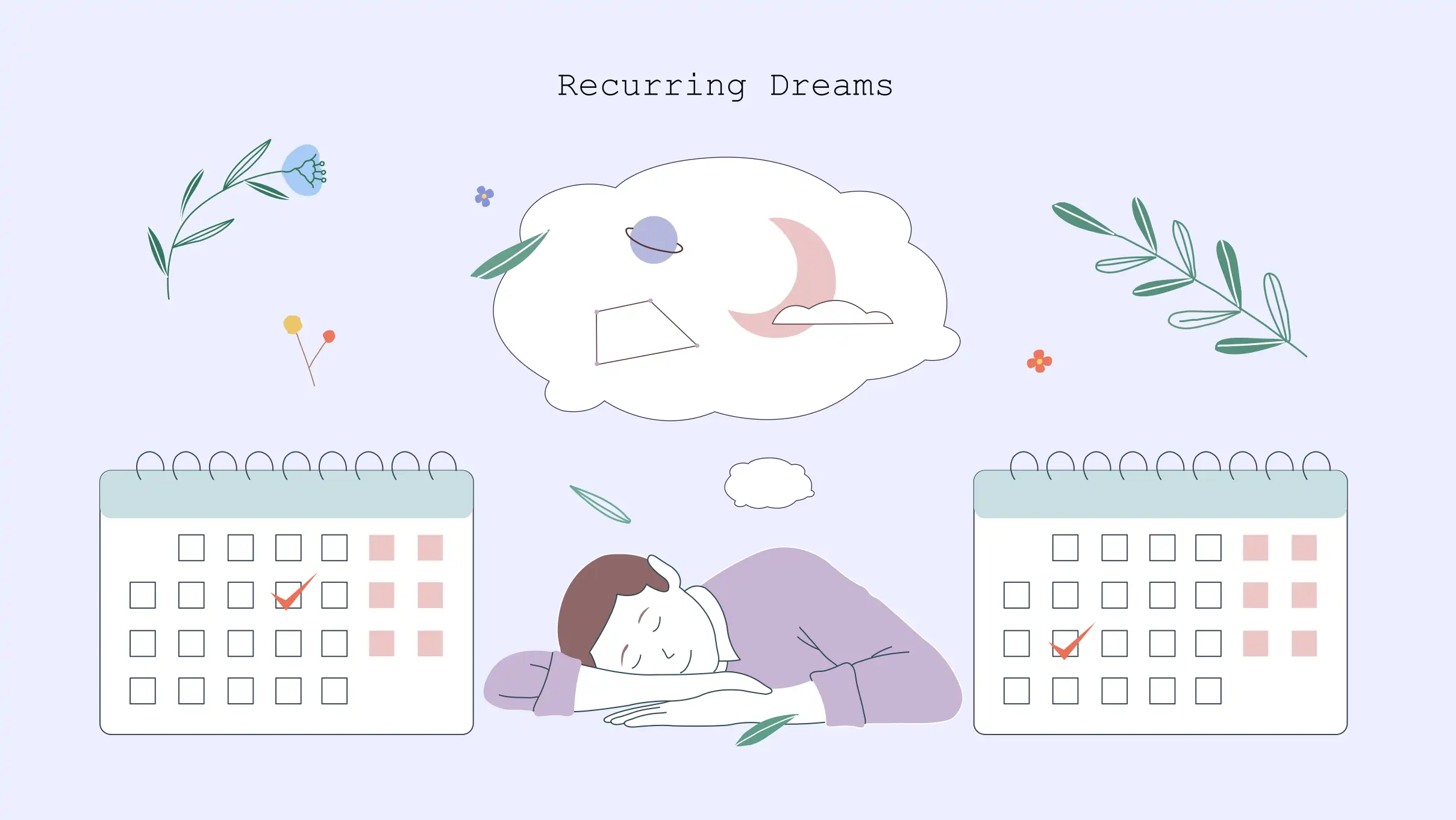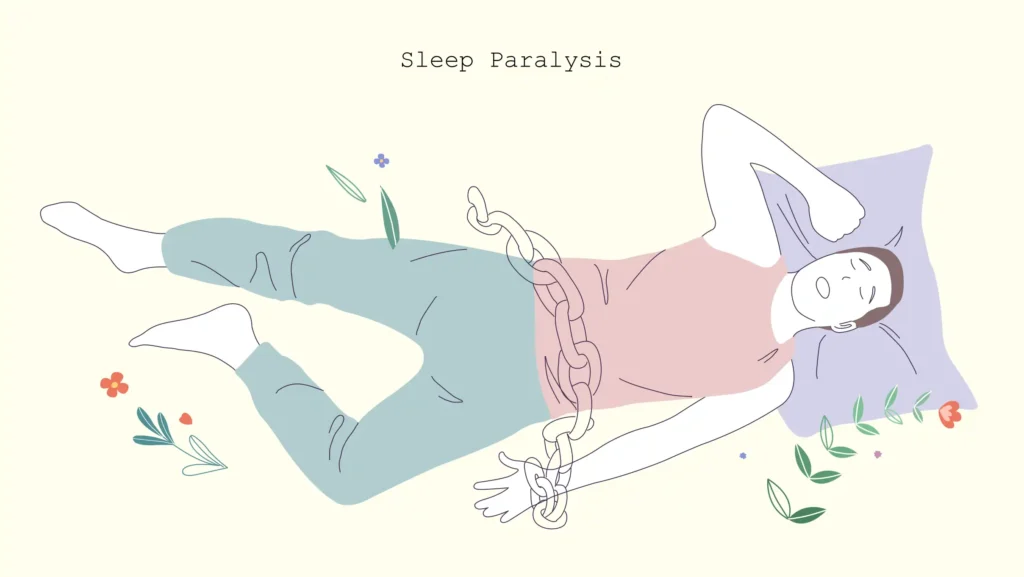Recurring Dreams: What Do They Mean
Written by


Dreams can be of many types, such as regular dreams, daydreams, lucid dreams, false awakening dreams, vivid dreams, and nightmares. Besides these, there are also recurring dreams.
Recurring dreams are referred to dreams that tend to repeat more than once. And many theories suggest that recurring dreams are related to unresolved difficulties or conflicts in the dreamer’s life.
But where does that phenomenon crop up from?
To answer the curiosities, read down further. This article discusses the meaning of recurring dreams, Indian and western insight on dreams, common recurring dreams and how to stop a recurring dream.
What Are Recurring Dreams
Dreams that are experienced repeatedly are called recurring dreams. These dreams can be pleasant or nightmarish and unique based on the person and their experiences.
The recurring dreams often include confrontations, finding yourself naked in a public place, being chased, or falling. Besides the recurring themes, the dreams can also repeat the same narrative, which can be disturbing.
What Can Cause Recurring Dreams
Although dreams are notoriously hard to study, there are certain hypotheses and suggestions regarding the subject.
Recurring dreams can be neutral or nightmarish. And according to dream theorists, recurring dreams might reflect situations or feelings that are particularly salient, enduring, or otherwise stressful difficulties in the dreamer’s life. They can also be due to an underlying mental health condition, substance use, or certain medication. But what do recurring dreams means, exactly?
What Do Recurring Dreams Mean
Everyone has a different perspective regarding the interpretation or meaning of dreams. However, according to the father of psychoanalysis, Sigmund Freud, dreams are symbols of desires that are not acceptable in the conscious state of mind.
Meanwhile, in the Indian context, all dreams have meaning and purpose, and anything seen in the dream is not just a development of the human mind but has a deeper significance.
And according to science, recurring dreams are related to unresolved difficulties or conflicts in the dreamer’s life. For example, recurring dreams about teeth falling out or dreams about falling and flying may mean loss and important life changes. Recurring dreams may also be a way to work through unmet needs and process any trauma or an alert to avoid any unforeseen danger.
Besides the above-mentioned dreams, there are other common recurring dreams.
Most Common Recurring Dreams
While a dreamer might not dream the same thing twice, specific dream themes may remain consistent from person to person. These dream themes might not be frightening, but they’re more likely to involve negative or stressful experiences than positive ones.
The common recurring dreams include:
- Physical aggression by another character
- Encounter with stranger
- Falling
- Being Chased
- Flying
- Car accidents
- Recurring dream about teeth falling out
- Death of the dreamer or their family or acquaintance
- Confrontation with fantastical beings like monsters, zombies, animals, or similar creatures
- Recurring dream about someone breaking into the (dreamer’s) house
- Being stuck or trapped
- Recurring dream about a house with many rooms
Most of the above-mentioned recurring dreams were reported to fall under emotional tone: positive, negative, neutral, or a combination of positive and negative. For instance, 45.5% of participants experienced negatively toned dreams that fall under aggressions and violence, like the threat of violence or physical aggression by a human, animal or other creature.
Approximately 8% of participants reported dreams involving encounters with strangers. This dream can fall under a different category. This dream reflects their growing exposure to and awareness of strangers in their everyday lives and a broadening of social networks.
What Recurring Dreams Do Children Have
A study collected and reported linked above, recurrent dreams of young adolescents aged between 11 and 15 years. The report suggested that recurrent dreams in children are usually more negative than positive. Their recurring dreams mostly follow themes like confrontations with monsters or animals, followed by physical aggression, falling and being chased.
Even with a scarcity of evidence, another study reported children of 29 months, 41 months, 50 months, 5 years, and 6 years might also get recurring dreams such as nightmares. In the report, the dreams are often described as bad, anxiety, scary, and nightmares since there aren’t any ways to prevail the dream content.
How to Stop Recurring Dreams
Although recurring dreams can be both negative and positive, the chances of them being positive are few. Recurring dreams that provoke negative emotions like fear, stress, sadness, or anxiety can be profoundly upsetting and sleep-disrupting. So, here are ways to cope with or reduce these disturbing dreams.
Following are ways to stop a recurring dream:
Therapy or Counselling
Recurring dreams are often associated with mental health conditions such as stress and agitation due to PTSD or anxiety and fear due to past trauma. In situations like these, therapy and counselling, mainly known as cognitive behavioural therapy (CBT), can be helpful.
Exercise
Lifestyle modifications could be an easy way to improve health and quality of life. Even though limited, evidence suggests people who exercise regularly have better emotional resilience. It also helps improve mental health by reducing anxiety, depression, and negative mood and improves self-esteem and cognitive functioning.
Relaxation Exercises
Therapeutic exercises like meditation and breathing exercises help reduce stress, anxiety, depression, and pain. Relaxation exercises also help reduce physiological responses like increased heart rate, palpitations, diaphoresis, shortness of breath, and muscle tension.
Discussing Your Dreams
Instead of dealing with it yourself, try discussing the dreams with friends and families or sign-up for talking therapy. It will help the person feel better, which in turn helps them deal with the situation better.
Maintain Sleep Hygiene
Sleep hygiene is one of the important variables for good sleep. And a relaxing nightly routine might make it easier to attain proper sleep, even when you are concerned about recurring dreams. It can also help reduce anxiety and stress while improving sleep and mood.
Final Words
Although dreams do not make sense most of the time, they do proffer some insights into the emotions and internal conflicts of the dreamer. They might reflect the situations or feelings of the dreamer.
Furthermore, not all recurring dreams are bad; they can also be positive or neutral. In addition, recurring dreams that provoke negative emotions like fear, stress, sadness, or anxiety can be deeply upsetting and sleep-disrupting.
So, consider the above-mentioned ways how to stop a recurring dream based on your situation and what works better for you.
FAQs
What are my dreams trying to tell me?
Dreams reveal your true knowledge and emotions about a subject. They direct your attention to the things you require for development, integration, expression, and the stability of your relationships with people, places, and objects. They can assist you in adjusting your course and highlight any unfinished business.
Why am I suddenly having very vivid dreams?
Vivid dreams are more likely to occur if a person has sleep disorders like insomnia or narcolepsy, which prevent them from getting enough sleep. This risk can also be increased by changes to your sleep schedule, such as travelling abroad (and sleeping at a different time) or sleeping less than usual.
people like this article
Written by








